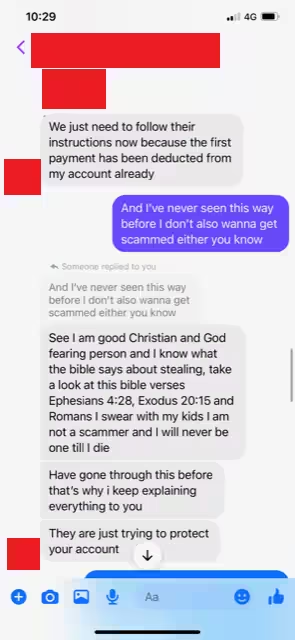KEY POINTS
- People are being warned about a new scam on online classifieds networks.
- A Melbourne woman almost lost $500 to a fake buyer using the scam technique.
- The consumer watchdog says there are a range of ways to protect yourself as a buyer.
Alexandra Duffin just wanted to sell her laptop on Facebook Marketplace when the standard message popped up.
"Is this still available?"
The 29-year-old responded yes, but notified the potential buyer that she had lost the laptop's charger.
"She said, 'That's fine. What's your pickup address?," Ms Duffin told SBS News.
The pair arranged to meet at a local restaurant for the exchange. The buyer told her she couldn't meet in person but would send a sibling to do so, and they wanted to use PayID for the payment.
A PayID is a unique piece of information such as a mobile number or ABN that people can use to accept payments.
Ms Duffin wasn't suspicious but confused at first when the buyer wanted her to set up a PayID account.
"She said 'I'm paying via my family business account - I'll need the seller's email address to confirm the payment'.
"And she sent me a screenshot of how to put your email through. It looked legitimate."

An interaction between Ms Duffin and a scammer, who told her she is a "God fearing person".
Ms Duffin gave her email address to the buyer, who sent back what appeared to be a bank statement with Ms Duffin's name and transaction purchase amount. In the same screenshot, there also appeared to be "different payments" that raised the Melbourne woman's suspicions.
Another thing that raised alarm bells was when the buyer said they would send Ms Duffin more money than what she had asked for.
'She said, 'I need to send you an additional $500 which in total (adds) up to $1200 to credit into your account immediately. Then when you're done, you have to refund my 500'."
Ms Duffin, a social media influencer, said she then received an email with a screenshot appearing to confirm $500 was in her account. Then the buyer asked for a refund.
"After I looked at the email, it said it was a Gmail account. I realised this is a scam," she said.
"We all know big companies don't use Gmail.
"I go 'Shame on you'. She (the buyer) left the group instantly. I've blocked her."
Many others have reported similar scenarios of people using PayID to con vendors on the social media network's classifieds section, and on the online classifieds marketplace Gumtree.
How does the PayID scam work?
Heritage Bank sent out an alert to customers last week warning them of how the scam operates.
It said unscrupulous buyers tell vendors that they are unable to meet in person and instead, their relative or friend would meet them.
"Scammers then send a fake PayID email to the seller," the bank said.
"This fake email states there was an issue receiving payment because PayID limits exist on non-business accounts.
"The seller must first transfer funds to increase their PayID limit so they can receive the payment. As soon as this is done, they are promised they will receive a refund and the buyer’s payment.
"Instead, unsuspecting sellers are tricked into paying money to scammers."

How to protect yourself from scams
Australia's consumer watchdog says the key to avoiding scams is to keep communication and transactions within a secure platform.
"Many people report losing money after communicating with the scammer over email to discuss a purchase on a digital marketplace," a spokesperson for the Australian Competition and Consumer Commission (ACCC) told SBS News.
How to protect yourself from scams
Australia's consumer watchdog says the key to avoiding scams is to keep communication and transactions within a secure platform.
"Many people report losing money after communicating with the scammer over email to discuss a purchase on a digital marketplace," a spokesperson for the Australian Competition and Consumer Commission (ACCC) told SBS News.





